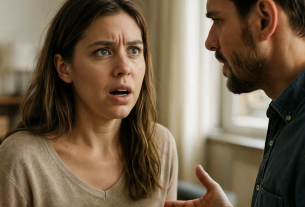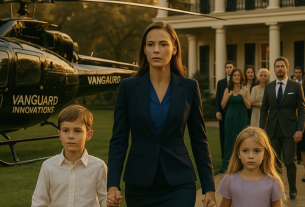I was born in the middle of winter — at the very end of February, when the cold still holds the earth, and hope for spring seems elusive. In a small town where summer seemed never to come. There, snow would settle as a dense blanket already in December and linger until April. The entrances of the apartment buildings smelled of sauerkraut, vinegar, old walls, and lives lived without much light. The town was somehow out of time — as if frozen in eternal gloom, as if waiting for something that never happened.
In Maternity Hospital No. 3, where I came into the world, there was no spring either. Neither literally nor figuratively. There reigned a sterile emptiness, staffed by doctors for whom my birth was just another entry in a chart. They knew: here, in this place, spring never comes. Not because warmth shouldn’t exist, but because it simply isn’t expected.
My mother… she did not cry when she left. She did not ask for forgiveness. She did not promise to return. She simply signed the papers, leaving behind the bars of the nursery window, the smell of antiseptic, and the newborn’s first cry. I remember once being told that she “refused” me. Just like that, briefly, as if the word meant nothing. But for me, it became the beginning of my entire life.
I had no last name. Only a dash in the documents. The nurses gave me a name — Yaroslav. That’s what they called all the boys born in January and February. It was their way of imposing some order on the chaos of lives that began here, in this maternity hospital. A list of names for each month of the year. As if they knew in advance that most of us would go through life without a name, without a story, without a parent’s gaze.
I was transferred to an orphanage. Then to an institution. Then another, and yet another. Every new address became part of my biography, but not part of my heart. No one wanted to take the “older” ones. Everyone chose babies who could be imagined to have a future or younger children whose eyes could still shine with hope. And I grew up, becoming too old for love with each passing year. Too complicated. Too real.
And all this time, a question kept spinning in my head: why? Why can a woman who carried you for nine months just walk away? What must happen inside a person to make them decide to refuse? What fear, pain, or despair can outweigh the bond between mother and child?
When I was about ten, I asked my caregiver:
— Have you seen my mother?
She just shrugged:
— There are many like you here, Slav. We don’t remember.
Her words didn’t hurt me then. Maybe because I already understood: to them, we were more numbers than names. But the question stayed in my heart. It became a stone I carried inside until I found the strength to break it apart.
When I turned sixteen, I decided to become a doctor. Not because I wanted to save people, not because I dreamed of a noble profession. No. I wanted to know. To understand the body’s structure, the mind’s workings, to peer into the very depths of the human soul. I wanted to understand why some give up, and others keep fighting. Why some give birth — and then immediately leave. Why some are willing to refuse what is most important.
That was the start of my journey. I studied, worked, survived. During the day — classes at university, evenings — shifts at a clinic, nights — a job at a pharmacy. No connections, no favors, no support. Only a hunger for knowledge and a rage that sometimes scared even me. I wasn’t taught by textbooks, but by house calls, emergency rooms, morgues, and the smells of blood, alcohol, and coffee brewed in advance.
When I got my diploma, I was twenty-four. When I truly became a doctor — twenty-six. Because a real doctor is born not at the moment of receiving documents, but the day he first feels responsibility for another’s life.
And then one day, on an ordinary shift at a district hospital, I entered a room and saw her. A woman about fifty. Gray hair, deep wrinkles, traces of lived years on her face. She had been brought in from her dacha after a stroke. An ordinary story. An ordinary condition. But when I opened her chart, my heart suddenly clenched.
“Pregnancies — 1. Births — 1. Refusal — yes. Year — 1995.”
The child’s birthdate — February 16, 1995.
Exactly the same as mine.
I stepped into the corridor. I clenched the chart in my hands as if it could change what I already understood. My head was pounding, my breath faltered, my legs wouldn’t obey. I returned to the room. She was already awake. Staring at the ceiling, as if counting cracks in her thoughts.
— Hello, — I said. — I am your attending physician.
She nodded.
— Where am I?
— At the district hospital. You were brought here after a stroke.
— Did I die?
— No. Not yet.
She smiled — crookedly, weakly, but alive.
I didn’t say anything else. Just treated her. Watched. Studied. She asked questions — rare, superficial ones. About food, medication, prognosis. On the third day, she suddenly said:
— Your eyes seem familiar. Have I seen you somewhere?
— Unlikely. You’re from the city, right?
— I was born here. But then left. Then came back.
Pause.
— Do you have children?
She hesitated. Then answered:
— There was one. But I… I left him then. I was a fool. Young. Afraid.
— And now?
She looked at me.
— I don’t know. I’ve never seen him. Don’t know if he’s alive. I was afraid all my life that he hates me. And probably rightly so.
I nodded. And said:
— He’s alive.
— How do you know?
I looked her straight in the eyes. Slowly. Clearly.
— Because he is me.
Silence fell. Thick, heavy. She didn’t scream, didn’t cry. Just gripped the edge of the sheet. Looked at me like a ghost she had long awaited but didn’t want to meet.
— You… I…
— Yes.
— Why are you here?
— I work. I treat. I live.
— Did you know?
— Only from the chart. I never searched for you. But you — you came yourself.
She was silent for a long time. Then said:
— I have no forgiveness.
— I don’t ask you for anything.
— Want to know why?
— No need. It’s too late.
Pause.
— I was afraid. I was 24. I lived in a dorm. The boy left. No money. They told me — you’ll go crazy on your own.
I wrote the refusal.
And every winter, when the snow lay, I thought — you are somewhere. That you are growing. That maybe you will forgive.
— I hold no grudge.
— Why?
I looked at her.
— Because if you hadn’t refused, I wouldn’t be who I am.
She stayed in the hospital for another week. I visited her even when I wasn’t on shift. We talked — sometimes a lot, sometimes little, sometimes just sat in silence together. Sometimes it seemed to me that those thirty years separating us simply evaporated. There was no pain, no past. Just two people who suddenly found themselves near again.
She never asked me to call her mom. I didn’t call her that. But once, as I was leaving, she said:
— I am proud of you.
— Thank you, — I replied. — That’s enough for me.
And truly, it was enough. Because long ago I stopped searching for a mother. I was searching for meaning. And I found it within myself.



